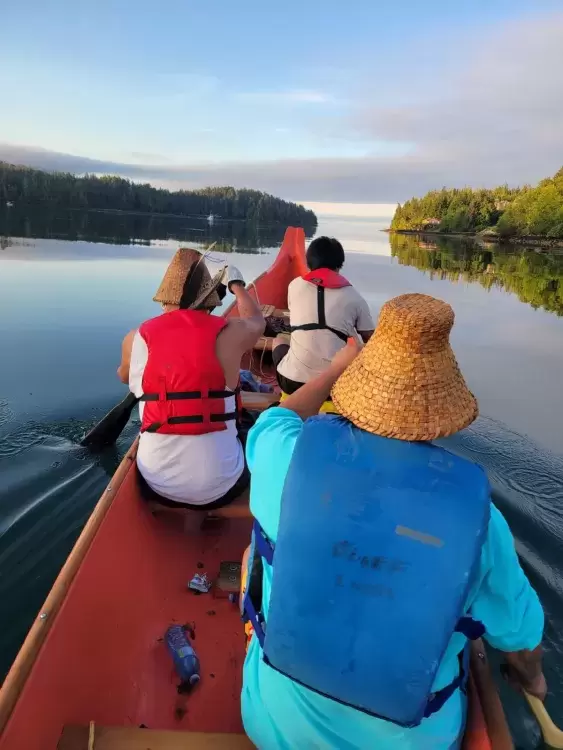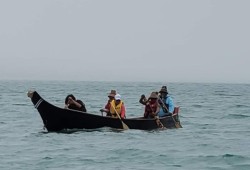Vince Ambrose was undoubtedly exhausted as he was nearing his home on Tuesday, Aug. 8.
Ambrose, the Hesquiaht First Nation hereditary chief, was on the final leg of his return drive home after participating in this year’s Paddle To Muckleshoot Canoe Journey.
Ambrose, who is 64 years old, paddled a total of 572 kilometres during his portion of the journey this year, which saw participants canoeing down the British Columbia coast and ending up in Auburn, a Washington state city south of Seattle.
The Muckleshoot tribe hosted a week-long celebration of cultural events, which marked the end of this year’s journey.
The cultural celebrations wrapped up on Sunday (Aug. 6). Ambrose then spent Monday and Tuesday travelling back home.
The number of journey participants for this year’s Paddle To Muckleshoot Canoe Journey varied along the course. Some joined at various points throughout the venture.
At one point there was as much as 91 canoes on the journey.
“It’s exhilarating,” Ambrose said. “You want to be out there all of the time.”
Journey participants would canoe various distances each day, camping in Indigenous communities nightly.
Ambrose had left Hesquiaht First Nation back on July 12 with his local canoeing partners and crew. The boats would be hosted by different First Nations along the route.
Ambrose is now semi-retired. He does a bit of work in the forestry sector.
“At my age I’m kind of old to be doing that hard labour,” he said.
But he certainly didn’t mind spending a couple of weeks with others on a tribal journey.
“Sometimes you’re up at four in the morning in order to get ready for a day of paddling,” he said. “It’s hard work, believe me. But I wouldn’t miss the tribal journeys for anything.”
For Ambrose, this marked the fourth time he has been on a lengthy tribal canoe journey.
His interest in the adventures began in 2016.
“The first time I went with my cousin,” he said. “I did a partial trip.”
But then, in 2017, Ambrose took part in a journey that was about 700 kilometres. That remains the longest one he has done to date.
Ambrose also ventured out on canoe journeys in both 2018 and 2019. The COVID-19 pandemic forced the cancellation of the events in each of the previous three years.
With the safe return to activities this year, Ambrose was once again keen to take part. As was evidenced by the dozens of other boats which took part this year, numerous others shared in Ambrose’s enthusiasm.
After having to miss three years of tribal journeys because of the pandemic, Ambrose was ecstatic to be back out on the water.
“It feels awesome,” he said. “We really looked forward to this. We prepared our canoe two to three months in advance.”
Ambrose was the skipper of his canoe, which featured three to six participants, depending on the day.
“I’m the one that steers the boat in the right direction and keeps the paddlers at a steady pace,” he explained of his skipper responsibilities.
Ambrose was confident those in his canoe would be able to successfully reach their final destination.
“There was no question we were going to do it,” he said. “We all enjoyed that, no matter how hard the work was.”
Ambrose is a bit disappointed that no community stepped up to host a tribal journey in 2024. As a result, he has now set his sights on taking part in another journey again in 2025. The Lower Elwha Klallam Tribe, based in Washington, is set to be the main host of the journey two years from now.
The Paddle To Seattle back in 1989 was the first official canoe journey involving various Indigenous communities in the Pacific northwest.
This year’s Paddle To Muckleshoot Canoe Journey was billed as an event honouring warriors, past and present.
“It’s an unparalleled celebration of heritage and culture,” said a promotional video of this year’s event.
Walter Pacheco, a Muckleshoot member, said his community was among those that took part in the 1989 journey.
“It became quite clear we had to get back to our gathering and travelling with each other and have potlaches because that was our history,” he said in another video detailing the journey’s history. “That was our tradition and culture. And it became more formal. It became more of a wellness type of situation.”


